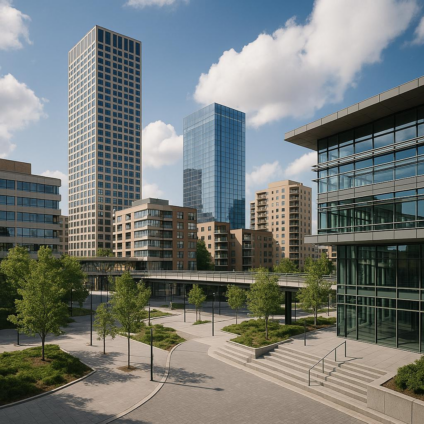Energy efficiency in the built environment is critical for sustainable development, especially in an urbanizing Ghana.
Adrian Odamtten, a mechanical engineer in the built environment, is advancing this field in meaningful ways with hopes that it becomes the meta at home.
With over 50 building energy models and reports that showed a minimum 10% energy savings cost over baseline, Odamtten is credentialed in integrated design processes and energy systems management. According to him, efficiency is the harvest of a careful, continuously improving plan.
“With electricity demand rising across all sectors, we need integrated solutions and energy efficiency measures to keep Ghana’s built spaces functional and affordable. We must apply a converging lens to the long-term facets of our builds, and forecast beyond the present. Our continuously evolving usage of energy systems amidst environmental concerns present a difficult challenge” he reflects.
Energy modeling is the use of mathematical simulations to predict and optimize energy system performance, and is central to improving efficiency in buildings.
On a macroenergetic level, models involve analyzing consumption patterns, generation, transmission and distribution, and using predictive methods to identify the most cost-effective and sustainable solutions for the country's energy needs.
On a microenergetic level, a commercial property would employ tools to predict annual energy requirements using hard parameters like site placement, and modulate mechanical, electrical, plumbing, and architectural parameters to quantify building loads.
Historical data is also very important for existing buildings to appreciate operational inefficiencies, and is a good teacher for guiding and commissioning material improvements.
Adrian Odamtten’s work spans residential, commercial, and industrial sectors, integrating load analyses and mechanical system designs.
He predicts annual energy needs for commercial properties to enhance operational efficiency, and his approach paints a good picture of how modeling can reduce the notable waste of energy.
Efficient buildings are key to cutting emissions, aligning with Ghana’s commitments to Sustainable Development Goals (SDGs) 7 (Affordable and Clean Energy) and 13 (Climate Action).
Energy-efficient structures would curb Ghana’s carbon footprint, projected to increase from 28 Mt CO2e in 2021 to over 140 Mt by 2050 under a business-as-usual scenario, per the national energy transition plan. Globally, buildings account for 39% of energy-related CO2 emissions, per the International Energy Agency (IEA), underscoring the relevance of mechanical engineers such as Adrian in a developing context.
Ghana’s growing electricity consumption industrial (42.3%), residential (40.5%), and commercial (16.9%) sectors, per 2022 IEA data highlights the need for efficiency in built spaces.
Odamtten’s past achievements in energy analysis have incorporated renewable sources like solar into new construction or rehab projects, reducing the burden on the national grid.
More importantly, his models reflect an optimized energy use across projects, with reduced consumption pressures.
Tech support exists to help enhance energy efficiency in difficult circumstances. Masterful professionals like Odamtten utilize cross-disciplinary collaborative tools that lead to more integrated solutions that address the technical, social, and economic aspects of energy provision.
Building Information Modeling (BIM) tools are the crux of an Integrated Design Process.
“We should see the Digital Twin rise to prominence in the upcoming years.” Adrian adds.
A Digital Twin is a virtual replica of a physical energy system that mirrors its real-world counterpart in real time.
This proactive approach to system management in tandem with a strong, resilient, and firm grasp on the cybersecurity difficulties it comes with can lead to a more efficient use of resources and faster response times in emergency situations.
Ghana is still in need of an intermediary between the analog and the digital, and a quantum leap between the two should not be expected.
Indoor Air Quality (IAQ) is tied to efficient built environments, and Odamtten addresses this with modeling. IAQ is emerging as a critical issue, particularly in urban areas where energy consumption is rising.
Adrian estimates that Metal oxide gas sensors, for example, help control the levels of pollutants like carbon monoxide (CO), nitrogen dioxide (NO2), and particulate matter (PM2.5).
The ground is fertile for growth in the energy sector and in the built environment. Adrian believes that as Ghana develops its energy infrastructure, there will be a need for professionals who can build, maintain, and optimize models.
Professionals with a focus on energy efficient engineering practices who can solve the difficult problems that stem from urbanization.
Adrian Thomas Odamtten is a highly skilled Mechanical Engineering professional with a BA in Economics from Lawrence University, USA and a BSc and MSc Mechanical Engineering from Washington University in St Louis USA.
His expertise is in the areas of operational efficiency, energy-efficient design and mechanical systems. He leverages parametric modeling and load analyses tools to optimize equipment selection and system design.
Latest Stories
-
Minority Leader lauds Mahama for Kwahu Business Forum
3 hours -
Photos: Second edition of Kwahu Business Forum held
4 hours -
Promoting sustainable cocoa production: UNDP programme proposes a multi-stakeholder approach
4 hours -
Morocco beat Mali on penalties to win U-17 AFCON
4 hours -
Raphinha’s 98th-minute penalty wins thriller for Barcelona
5 hours -
Manchester City strike twice late on to beat Everton
5 hours -
Villa hit four past Newcastle in stunning win
5 hours -
Have we reaped the whirlwind?
5 hours -
Ghana’s Ambassador to Malta celebrated for lifting Winneba Youth Choir onto global stage
6 hours -
Africa Makeup and Beauty Fair opens in Accra
6 hours -
Kwesi Yankah: Fighting cocaine with the cross
7 hours -
Adom Kwahu Easter: Patrons left spellbound as paragliders soar high
7 hours -
U-20 AFCON 2025: Black Satellites depart Accra for Egypt
8 hours -
Scientists claim to have discovered ‘new colour’ no one has seen before
8 hours -
Five dead as huge waves hit Australia coast
8 hours

